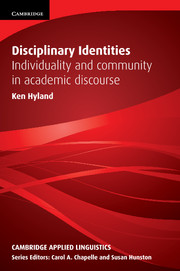Book contents
- Frontmatter
- Contents
- Series editors’ preface
- Preface
- Acknowledgements
- Notes on corpora and abbreviations
- 1 Identity: Interaction and community
- 2 Discipline: Proximity and positioning
- 3 Investigating identity
- 4 Identity in representational genres
- 5 Self-representation in academic bios
- 6 Culture: Authority and visibility
- 7 Reputation: Individuality and conformity
- 8 Gender: Disciplinarity and positioning
- 9 Identity, disciplinarity and methodology
- Appendix: Items with potential metadiscourse functions
- References
- Name Index
- Subject Index
4 - Identity in representational genres
Published online by Cambridge University Press: 09 February 2023
- Frontmatter
- Contents
- Series editors’ preface
- Preface
- Acknowledgements
- Notes on corpora and abbreviations
- 1 Identity: Interaction and community
- 2 Discipline: Proximity and positioning
- 3 Investigating identity
- 4 Identity in representational genres
- 5 Self-representation in academic bios
- 6 Culture: Authority and visibility
- 7 Reputation: Individuality and conformity
- 8 Gender: Disciplinarity and positioning
- 9 Identity, disciplinarity and methodology
- Appendix: Items with potential metadiscourse functions
- References
- Name Index
- Subject Index
Summary
Up until now I have been discussing disciplinary identity in fairly broad terms, raising issues of conceptualisation and methodology while introducing some key concepts. In particular, I have argued that we take a position as a particular kind of person only in proximity to a community. How we choose to express ourselves must resonate with group members so that our claims to membership are visible in the repeated patterns of language choices and acknowledged by insiders. While all identities are a negotiation of a self which is coherent and meaningful both to oneself and to others, disciplinary identity seems particularly dependent on this kind of acceptance. It crucially involves the identification with some community of others, taking on and shaping its discourses, behaviours, values and practices to construct a self both distinctive from and similar to those of its members. Identity, then, is a two-way street in that our identities are successful only to the extent that they are recognised by others.
In this chapter I want to begin to explore this relationship between the self and others more specifically by looking at particular communicative contexts – what I am calling ‘representational genres’. Clearly all genres are ‘representational’ in the sense that they express a performance of the actor in some way, but this is usually while he or she is doing something else, such as reviewing a book or speaking at a conference. ‘Representational genres’ are atypical in that they involve the direct assertion of identity claims and have the selfconscious expression of self as their primary purpose. Here academics are required to project themselves explicitly as competent individuals, using valued language forms and attributes.
Thesis acknowledgements, prize applications and academic webpages all offer a particularly clear and obvious illustration of the role of language in disciplinary identity construction, but they also relate to identity in very different ways. Acknowledgements and applications are concerned with self-aggrandisement, either explicitly or implicitly, and a graduate’s claim to a self with the attributes, understandings, experiences and values of a disciplinary member. Academic websites, in contrast, also explicitly present a version of the self, but this is often assembled by institutional functionaries to contribute to the branding and prestige of the employing university.
- Type
- Chapter
- Information
- Disciplinary IdentitiesIndividuality and Community in Academic Discourse, pp. 71 - 97Publisher: Cambridge University PressPrint publication year: 2012
- 1
- Cited by

